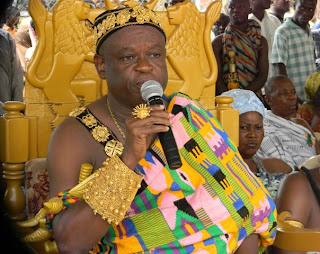 |
| Mrs Nyomi (left) congratulates a student. |
The Managing Director of Coastal Television, Mrs Nyomi, delivered a seminar talk to the graduating students of the Central Press College in Cape Coast.
The graduates were presented with a discussion entitled, ‘The Role of Female Journalists in Nation Building’. This talk was part of a series of seminars organised by the Central Press College for its students.
Introducing the guest speaker, the chief executive of the college, Mr Kwamina Bamfo-Agyei said:
“This is the batch [of students] that has many women participating, that is why we thought it wise to have a woman to be our guest speaker so that it can be a motivation to females in this media profession.”
The main focus of Mrs Nyomi’s presentation was the central role she believes female journalists have to play in the gradual development of Ghana as a nation. She stressed the importance of the way in which a newsworthy story is presented to the public and how this is key to the success of good print and broadcast journalism.
The timing of this speech delivered to the students was also an important factor as it was placed in the context of the upcoming elections later this year. Mrs Nyomi highlighted to the students that the education they were receiving in such a place as the Central Press College was equipping them with the required skills to practice a higher standard of journalism:
“With this kind of education that you have, you are going to make an impact wherever you find yourself.”
The concept of a more informed journalism was coupled the idea of being more innovative and creative while producing and presenting news stories. Mrs Nyomi called for a more colourful way of presenting the news, a style that is more Ghanaian in the form of its presentation, in contrast to the straight broadcast style adopted by many western media networks. Mrs Nyomi added:
“There is one radio station in Ghana that sometimes exaggerates, but I like it because they are telling stories. They tell it like we would tell a story to our children or among ourselves.”
 |
| Mrs Nyomi, lecturers and students at Central Press College |
Mrs Nyomi concluded her speech by stressing the need for journalists in Ghana to make an impact and to ask the important questions that will provide the answers to many of the big issues in Republic of Ghana today. This point was explained in further detail in the context of politics. It was explained to the students that their level of education in the practice of journalism gave them the power to ask the burning questions of the day to the politicians and get the answers that would essentially create a greater sense of transparency and understanding in the politics of Ghana today. As a result, it is believed that freedom of the press will develop further, thus contributing to the wider concept of nation building.
Speaking on behalf of the students and members of the Campus Journalists’ Association, its President, Shaderik Boakye said:
“We should all try as much as possible to abide by all the rules and regulations given us and the code of ethics of the Ghana Journalist Association.”








